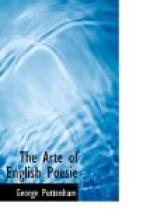brought vp or acquainted with any excellent Arte, nor
able to contriue, or in manner conceiue any matter
of subtiltie in any businesse or science, they doe
deride and scorne it in all others as superfluous
knowledges and vayne sciences, and whatsoeuer deuise
be of rare inuention they terme it phantasticall,
construing it to the worst side: and among men
such as be modest and graue, & of litle conuersation,
nor delighted in the busie life and vayne ridiculous
actions of the popular, they call him in scorne a
Philosopher, or Poet, as much to say
as a phantasticall man, very iniuriously (God wot)
and to the manifestation of their own ignoraunce,
not making difference betwixt termes. For as the
cuill and vicious disposition of the braine hinders
the sounde iudgement and discourse of man with busie
& disordered phantasies, for which cause the Greekes
call him [Greek: phantasikos] so is that part
being well affected, not onely nothing disorderly
or confused with any monstruous imaginations or conceits,
but very formall, and in his much multiformitie vniforme,
that is well proportioned, and so passing cleare, that
by it as by a glasse or mirrour, are represented vnto
the soule all maner of bewtifull visions, whereby
the inuentiue parte of the mynde is so much holpen,
as without it no man could deuise any new or rare
thing: and where it is not excellent in his kind,
there could be no politique Captaine, nor any witty
enginer or cunning artificer, nor yet any law maker
or counsellor of deepe discourse, yea the Prince of
Philosophers stickes not to say animam non intelligere
absque phantasmate, which text to another purpose
Alexander Aphrodiscus well noteth, as learned
men know. And this phantasie may be resembled
to a glasse as hath bene sayd, whereof there be many
tempers and manner of makinges, as the perspectiues
doe acknowledge, for some be false glasses and shew
thinges otherwise than they be in deede, and others
right as they be in deede, neither fairer nor fouler,
nor greater nor smaller. There be againe of these
glasses that shew thinges exceeding faire and comely,
others that shew figures very monstruous & illfauored.
Euen so is the phantasticall part of man (if it be
not disordered) a representer of the best, most comely
and bewtifull images or apparances of thinges to the
soule and according to their very truth. If otherwise,
then doth it breede Chimeres & monsters in
mans imaginations, & not onely in his imaginations,
but also in all his ordinarie actions and life which
ensues. Wherefore such persons as be illuminated
with the brightest irradiations of knowledge and of
the veritie and due proportion of things, they are
called by the learned men not phantastics but
euphantasiote, and of this sorte of phantasie
are all good Poets, notable Captaines stratagematique,
all cunning artificers and enginers, all Legislators
Polititiens & Counsellours of estate, in whose exercises




